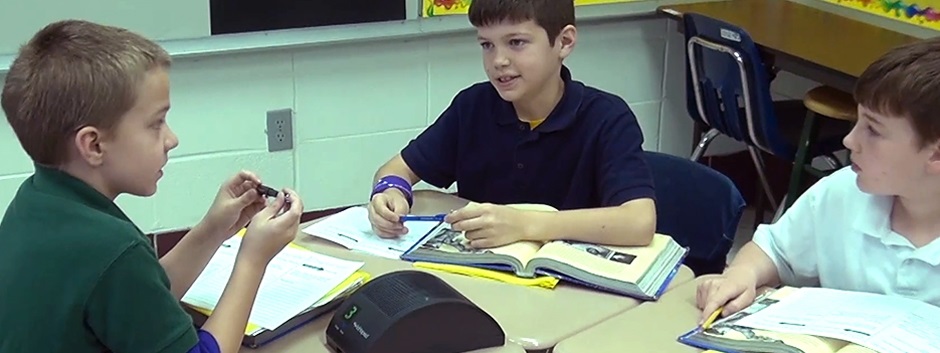4 Keys to Finding and Using Technology in Early Elementary Classrooms

Incorporating tech into the classroom appropriately can be particularly challenging with younger students. Here are some suggestions for balancing innovation and safety.
By Victoria Mendoza
Finding quality technology resources to incorporate into the classroom can be challenging for any teacher, but it may be a particularly tall order for teachers of younger students. As a kindergarten teacher, I’m all too aware of the heightened concerns about screen time and what is and is not age-appropriate for our littlest pupils. Here are a few suggestions to help bring tech tools that are age-appropriate and educationally relevant into the classroom without spending a ton of time hunting them down.
1) Pick visual media with a specific teaching purpose.
So many kids come to school without basic social skills, and heavy use of technology can impede their development in that area. I want to make sure that if I’m using technology in my classroom, it’s meaningful, engaging, and relevant to the lesson. It can’t be an excuse for me to be lazy and say, “Here, I couldn’t think of anything better to do, so just sit on the iPad.”
One example of how video technology can do more than just present information is Skype Virtual Field Trips. My school is about two and a half hours south of Atlanta, and I have students who have not had the opportunity to visit. Going places like California or the Statue of Liberty in New York are not feasible either, but with nothing more complicated than a webcam, we can bring the outside world into our classroom.
We use video in a variety of other ways, as well. I find videos make great warmup exercises. When we practice with math, for example, we might begin by watching a video to practice counting to 100 or reviewing our shapes. Young kids love to sing and dance, and videos with songs about the alphabet are a great way to get the party started some days. Other times, we may watch a video about particular letters or sight words we’re working on, just to reinforce concepts that we’ve covered during other activities.
We also sometimes use videos as brain breaks. My students only get one recess, and that can be pretty tough on such young children. Our brain break times are critical and essential to helping us regain focus for instructional time. They need their breaks!
2) Save yourself and your students time by using education-focused platforms.
When I’m showing kids a video, one of the last things I want to introduce to my classroom is advertisements. They’re a waste of class time and often aren’t even related to the content of the video. Even while looking for educational content at home, I’ve seen a Victoria’s Secret ad or something else inappropriate pop up! I don’t want that happening in my classroom, so it’s important to screen the vides before I use them in class.
There is some content on YouTube that I can’t find elsewhere, so I do use it occasionally, but I try to use video services purpose-built for education whenever possible. One educational video provider I’ve found quite useful is Boclips for Teachers. All the videos are educational, and there are so many that I know I’ll be able to find something relevant to the lesson I’m working on. They have a lot of content for young students, too, and have been adding more since I became a user, which I’ve found is often not true of many educational video providers.
3) Find inspiration in teacher communities and social media.
Teacher communities online and off are an invaluable resource. I’m a member of the Georgia Science Teachers Association, and it was on their Facebook page that I found Boclips, for example. The teacher communities on Instagram are so active that there’s always someone talking about their experience with this new gadget or that new service.
But teacher communities help me serve my students better beyond just discovering new resources for the classroom. They also help me figure out if those resources are worth exploring or not. I may not be sure that a particular tool or piece of content would be useful in my curriculum, but seeing how other teachers use it—or tried it with limited success—can help clarify that.
Beyond that, just seeing other educators who are passionate about their practice and delivering instruction in creative ways challenges me to continue striving to improve my own practice.
4) Balance tech time with analog activities.
Teaching my students to use technology isn’t difficult: many of them navigate an iPad better than I can. The challenge is in incorporating technology in a way that’s meaningful and relevant to our learning goals without taking away from other experiences, so I incorporate plenty of activities that aren’t tech-based.
My kids love practicing their writing in the Seesaw app on their iPads, for example, but I also have them work on their pencil grip with an actual pencil.
The same students who come into my class able to navigate an iPad with no problems may have no idea what to do with Play-Doh—which happens to be great for practicing fine motor skills, developing creativity, and just having fun. I like to make sure we do plenty of STEM activities, where they get to dig in and get their hands a little dirty while they flex those growing minds.
Victoria Mendoza is a kindergarten teacher in Georgia. She can be reached on Twitter at @learninginrm509.


